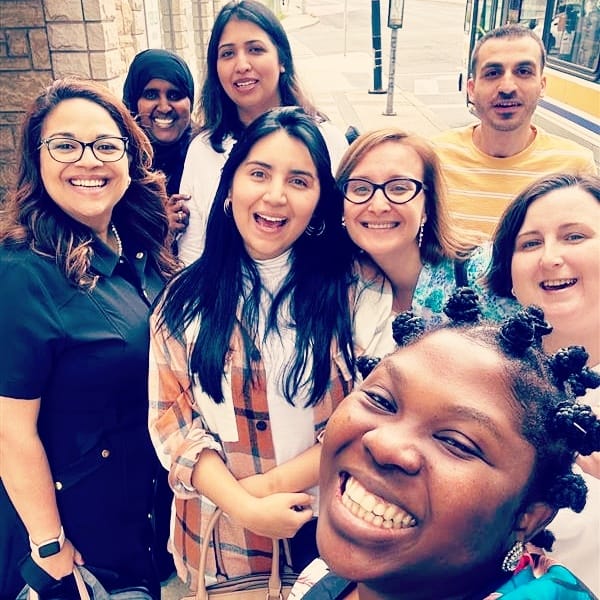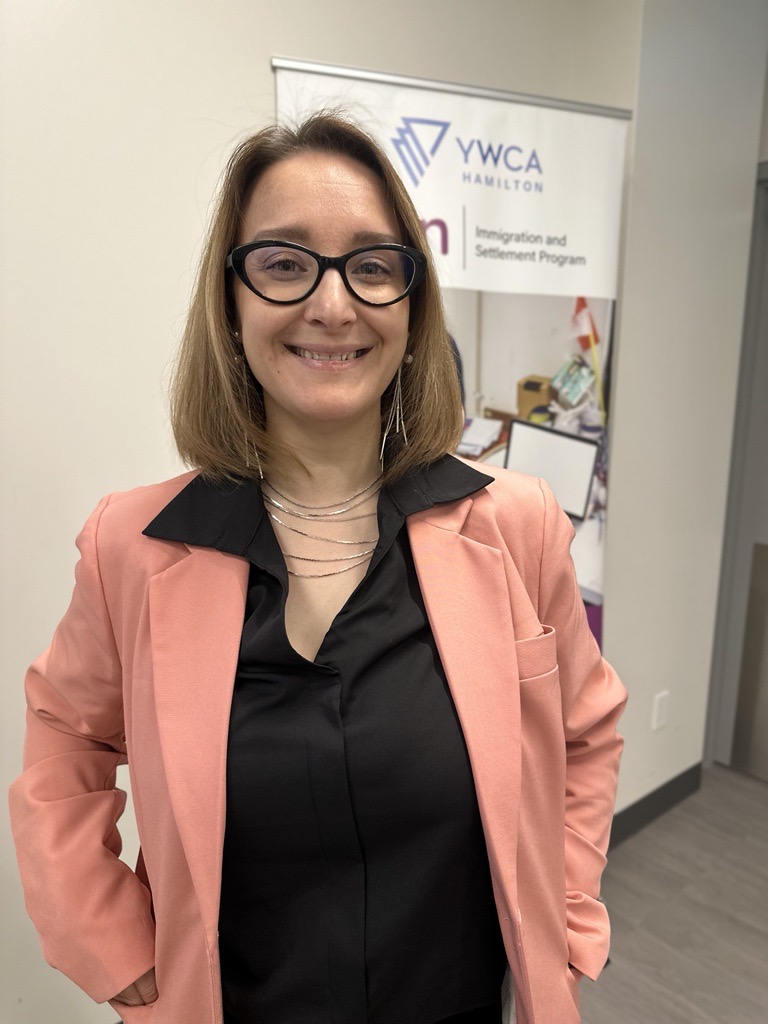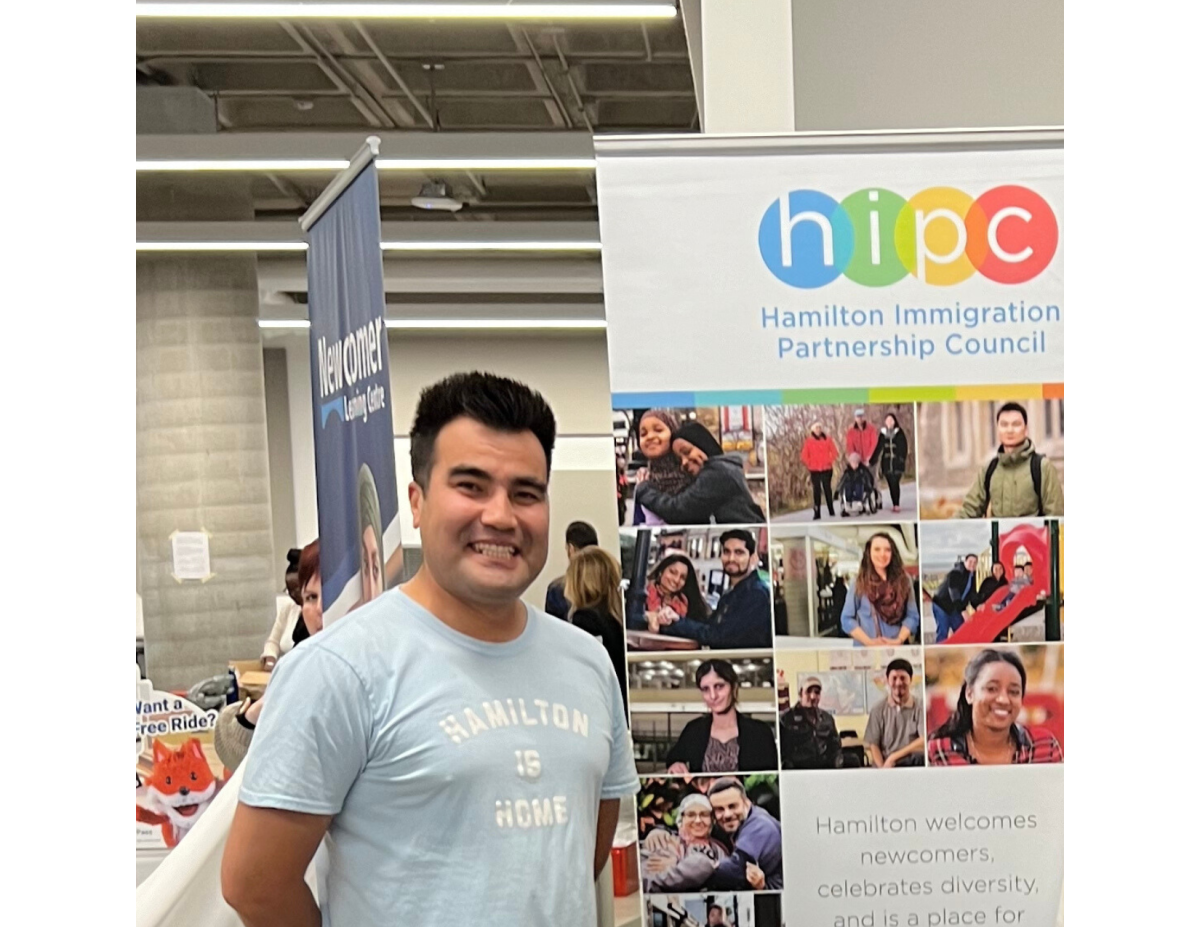As a settlement councillor, Svitlana Bondarenko works closely with Ukrainian newcomers at the Hamilton YWCA, many of whom came to Canada fleeing the war back home.

The 38-year-old helps immigrants build a new life in the city, whether it be by helping them find housing or education opportunities, land a job or simply learn to navigate life in Canada.
But only just over a year ago, Bondarenko herself arrived in the country with her husband, mother, teenage son and two French bulldogs under the Canada Ukraine Authorization for Emergency Travel.
“We didn’t have any choice,” Bondarenko said. “It was a safety measure. If you want to be safe and have any future for yourself and for your family — especially for your child — you don’t have options. You just pack a bag and leave.”
Fleeing from the war in Ukraine, the family left behind Kyiv to settle in Hamilton.
Now, as a settlement councillor and newcomer herself, Bondarenko said she’s seen firsthand how difficult it is for immigrants to find affordable housing in the city and meaningful, well-paying work that can ease the burden of the high cost of living in Hamilton.

It’s a sentiment echoed in a survey released this month by the Hamilton Immigration Partnership Council that showed that immigrants across the city are struggling with unaffordable housing, inadequate incomes and finding employment that matches their skills.
Surveying 689 immigrants who live, work or study in Hamilton, the study (conducted in eight languages) captured responses from permanent and temporary residents, refugees, international students, temporary foreign workers, Ukrainian newcomers and others. Bondarenko also took the survey.
Nearly 70 per cent of participants said their income was inadequate in that it wasn’t meeting their needs, while 40 per cent said their housing was unaffordable.
“In terms of quality of life and well-being, many of the participants reported that they felt a strong sense of belonging in Hamilton. And they wanted to stay here permanently,” said Mohammad Araf, immigration program officer for the Hamilton Immigration Partnership Council.
Nearly one-third of participants said they were “quite satisfied” with their lives, while 46 per cent were “somewhat satisfied,” rating their satisfaction between a five and seven on a zero-to-10 scale.
“But we also noticed that feelings of isolation and experiences of discrimination were quite prominent,” Araf added.
Underemployment rampant among newcomers
Although 72 per cent of survey participants had a bachelor’s degree or more, half of those working reported being employed in jobs that didn’t match their skills, education or level of experience.

Get daily National news
The percentage was even higher among newcomers, refugees, racialized participants, women and other subgroups.
For Bondarenko, finding a job after arriving in Canada wasn’t easy.
“I’m not talking about, like, an office position … I’m talking about even general labour positions,” she said.
Bondarenko said she saw job postings for positions she wanted that either required her to be “highly educated” or have “Canadian experience” in the area.
Though she holds a masters degree in finance and worked at a bank for over a decade in Ukraine, she found herself often disqualified on these two fronts.
Then, when she applied for jobs she was overqualified for, she said employers wouldn’t hire her because she had too much education and experience.
Ontario announced Thursday that it would introduce legislation that, if passed, would make it the first province in Canada to ban the use of Canadian work experience as a requirement in application forms and job postings.
“We know that … not only in Hamilton, but just nationally, immigrants often find themselves in jobs that don’t match their qualifications. And in our survey, we also see the same thing that 50 per cent said that they were underemployed,” Araf said.
“We also know that knowing English … is also important. Because we saw that there was a big difference between people who speak English very well and people who don’t.”
Araf said being able to access local services where immigrants may be able to improve their English skills and get help finding a job is critical in helping newcomers find work that matches their experience.
Disparities in the immigrant experience
Araf noted that the survey also showed disparities in outcomes among different groups of immigrants.
“For example, family class immigrants generally have better outcomes on some of the questions that we asked, but refugee claimants and temporary foreign workers, for example, reported worse outcomes,” he said.
When it came to housing, racialized immigrants were more likely to live in unaffordable conditions at 42 per cent, while 35 per cent of white counterparts reported the same.
International students reported the highest rate of feeling isolated at 47 per cent, while racialized immigrants reported higher rates of feeling isolated than white immigrants.
Over one-third of survey respondents also reported experiencing discrimination in the past year.
“The top context in which immigrants who participated in the survey reported that they experience discrimination is in workplaces, or when applying for a job or a promotion,” Araf said.
Bondarenko said though she’s white and doesn’t face the same challenges that racialized immigrants do, she has also felt discriminated against for her Ukrainian accent during her job hunt.
How Hamilton can help newcomers
It took Bondarenko five months after her arrival before she came into the position she has now with the YWCA and though it’s not in her field, she says she’s happy to help others like her find their way in Canada.
She added that landing the job wouldn’t have been possible without the support of services meant to help newcomers.
“I was fortunate, really fortunate, I met our employment counsellors from YWCA and they started working on my resume, cover letter, interview, and we applied to different positions,” she said. “And then in YWCA, there was an opening for a Ukrainian settlement councillor and I got it.”
Araf said he hopes the survey will help service providers and policy makers in Hamilton better address issues that concern immigrants and help them settle into the city.
Federal Immigration Minister Marc Miller announced last week that Canada’s immigration strategy in the coming years will focus on aligning immigration policy with the country’s labour market needs.
As a settlement councillor and newcomer herself, Bondarenko said she’d like to see the government do more to help newcomers.
“I think government should just readdress the immigration policy, because yeah, you’re saying you’re inviting immigrants, but unfortunately, after they come to the country … I don’t see a lot of help.”










Comments
Want to discuss? Please read our Commenting Policy first.